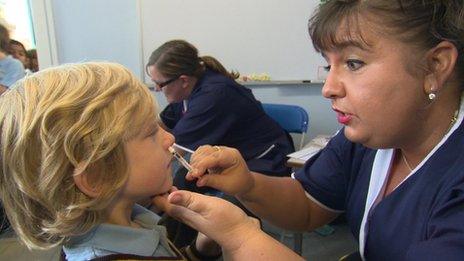Flu at-risk groups urged to get vaccinated
- Published

The nasal spray flu vaccine has been introduced this year
People at most risk from flu this winter should make sure they get vaccinated against the virus, says Public Health England.
For the first time, a nasal spray vaccine is being offered to all two- and three-year-old children because they are key "spreaders" of the virus.
People over 65, adults and children with long-term health conditions and pregnant women are known to be at risk.
Around 800 people were admitted to intensive care with flu last year.
A national advertising campaign is being launched by Public Health England to encourage parents of two- to three-year-old children, and other at-risk groups, to take up the offer of a vaccination.
This follows research which found that young children's close contact with each other means they are more likely to transmit the virus to other vulnerable people, such as babies and elderly people.
The national flu vaccination programme should eventually include annual vaccination of all two- to 16-year-olds.
At present the government says it would not be effective for the NHS to vaccinate every healthy person against flu. However people can still pay for the flu vaccine at their local pharmacy.
Every each winter hundreds of thousands of people see their GP and tens of thousands are hospitalised because of flu.
Prof Dame Sally Davies, chief medical officer, said being protected against flu was vital for certain groups of people.
"Severe winter flu and its complications can make people really ill and can kill - you are eleven times more likely to die from flu if you are in a clinical at-risk group.
"I urge everyone who is eligible to get the vaccine and help protect themselves and their families this winter."
Dr Paul Cosford, medical director and director for health protection at PHE, said flu was unpleasant for the majority of people but could be life-threatening for others.
"It can be very serious for older people and those groups at risk of developing complications including people with weakened immune systems, as well as those with underlying conditions such as neurological disorders, liver, lung or renal disease, heart problems or diabetes, and pregnant women.
"Vaccination remains the best way to protect against the potential serious harm from flu this winter."
For information on how to get vaccinated, contact your local GP surgery.